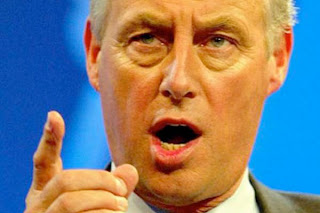Together with other accusations of influence by lobbyists on MPs, and the alleged giving by Tim Yeo of advice to a rail freight company seeking to influence Parliament, the revelations give fresh impetus to calls for MPs and ministers not to get involved in decision-making on matters in which they have an interest.
The list, together with their connections, is published at the bottom of this article. It is noteworthy that none of the ministers with connections to the fossil fuel industry voted for the decarbonisation target.
The list comes from cross-checking the list of those who voted against the amendment with the list of ministers with such connections published in March by the World Development Movement, which itself had collated it from numerous publicly available sources.
The WDM's exercise found that one third of all 125 government ministers have such connections.
This does not account for any connections held by backbench MPs, such as Peter Lilley, who voted against the amendment. He, for example, is a non-executive director of Tethys Petroleum Ltd, as well as having been paid £22,462 in July 2011 for giving advice to Ferro Alloys Corporation Limited on the management and flotation of a power generating subsidiary.
Top ministers with fossil fuel connections include William Hague, Vince Cable, George Osborne, Michael Fallon and Greg Barker. They all have links with big finance, oil and coal companies that are driving climate change.
Foreign secretary William Hague, who used to work for Shell, helped Tullow Oil escape paying a £175m tax bill in Uganda, one of the world’s poorest countries. Mr Hague made a personal phone call to the Ugandan president on Tullow Oil’s behalf.
Vince Cable, secretary of state for business and skills, in charge of regulating companies, worked for Shell and was referred to as "contact minister for Shell" by a top Shell executive in 2012.
His business and now also energy minister, Michael Fallon, was an independent non-executive director responsible for inter-dealer broking (until 2012) of Tullett Prebon plc, specialising in Energy & Commodities.
Chancellor George Osborne accepted donations worth £38,000 from the head of CQS, a hedge fund that channels millions of pounds into climate-warming energy. Also, his father-in-law, Lord Howell, is president of the Shell and BP-funded British Institute for Energy Economics. Lord Howell was a Foreign Office minister until 2012.
Energy minister Gregory Barker, who shamefully voted against the amendment, has been the head of international investor relations for Anglo Siberian Oil and Sibneft, a Shareholder in New Star European Growth Fund plc and Henderson High Income Trust plc and corporate finance director of the Australian-owned International Pacific Securities.
The vote on the amendment would have been different if just 12 MPs had voted differently.
It would be in the interests of democracy, let alone the planet in this case, that MPs should be barred from voting on matters in which they have a financial interest.
By the way, mandatory carbon reporting introduced by the government will force fossil fuel companies to disclose their carbon footprints, but banks and other institutional investors will not have to declare the emissions arising from their loans and investments.
Yet without them, big oil, gas and coal companies like Shell, BP and Rio Tinto would not be able to raise billions from pension funds, banks and other financial investors based in the City of London and beyond.
By including these ‘financed emissions’ in mandatory carbon reporting regulations, Vince Cable could force financial institutions to disclose their full carbon impact and fully expose the degree of exposure that these institutions have to the carbon bubble.
The 'carbon bubble' is the name given to the assets held by these institutions which may become worthless if they are not allowed to be exploited by national or global level agreements to curb global warming.
It is therefore in the interests of these companies themselves to account for the impact of such investments.
The lists:
Here is the list of ministers who voted against the amendment, together with their connections to the fossil fuel industry:| Gregory Barker | Anglo Siberian Oil (1998–2000) Head of International Investor Relations for Sibneft (1998) 50 Shareholder in New Star European Growth Fund PLC and Henderson High Income Trust PLC.51 Corporate Finance Director of the Australian owned International Pacific Securities |
| Vincent Cable | Chief economist and other positions at Shell International (the world’s most carbon intensive oil company: A leaked memo addressed to Cable from Shell’s chief executive referred to him as “contact minister for Shell”) (1990-1997). |
| David Cameron | Accepted £10,000 from Jonathan Green of hedge fund GLG Partners. GLG is a frequent investor in fossil fuels. Accepted £10,000 from Mark Foster Brown of hedge fund Altima Partners (2005), which deals in fossil fuel shares, including Cadogan Petroleum and Lonrho plc,29 which is a multi-sector company involved in building port terminals in Africa “to support the oil and gas industry" |
| Kenneth Clarke | Director of Foreign and Colonial Investment Trust plc (until 2007) |
| Nick Clegg | Accepted £9,000 from Neil Sherlock, head of public affairs at auditors KPMG (2006-2008) |
| Michael Fallon | Director of Tullett Prebon Plc (independent non-executive); inter-dealer broking (until 2012) |
| Robert Goodwill | Shareholding in Barclays, Gazprom and Lukoil. Accepted £11,000 donation from Mountboon Investments Ltd financiers (2010) |
| Dominic Grieve | Total shareholdings of more than £240,000 in Anglo American, Standard Chartered, Rio Tinto and Shell |
| Michael Gove | Accepted £10,000 donation from Aidan Heavey, founder and chief executive of global gas and oil company Tullow Oil(2010) |
| William Hague | Worked for Shell UK (1982-83). Accepted over £25,000 in non-cash donations from CQS |
| Stephen Hammond | Director Commerzbank Securities (2000–Present) Has shareholdings in Peal Gas Ltd |
| Greg Hands | Worked or three different firms in an eight year banking career. (1990-97) |
| Matthew Hancock | Payment of £3,000 from UBS AG for speech (2011)74 |
| Mark Hoban | Payment of £1,300 from JP Morgan Chase for speech (2010)76 |
| Nick Hurd | Represented a British bank in Brazil (1995-1999). |
| Sajid Javid | Directorships and other senior positions at Deutsche Bank AG, (2000-2009), JP Morgan Partners LLC (1997-2009) and Chase Manhattan Bank (1991-1994) |
| Jo Johnson | Investment banker at Deutsche Bank (until 1997) |
| David Lidington | Worked for BP (1983-86) and Rio Tinto (1986-87) |
| Mark Lancaster | Management consultant at Palmer Capital a privately owned venture capital and fund management business. (resigned 2012) |
| David Laws | Vice President JP Morgan’s Treasury Division (1987-1992) Managing Director Barclays De Zoete Wedd (1992-1994) |
| Maria Miller | Marketing manager Texaco (1990-1994) |
| Francis Maude | Member of Barclays’ Asia-Pacific Advisory Committee. (2005-2009). The Conservative Party’s Implementation Team which reported to Maude also received significant donations in kind from accountancy firms KPMG, PriceWaterhouseCoopers, Ernst and Young and Deloitte. |
| Theresa May | Shareholdings held by self and spouse in Prudential Corporation plc. Accepted donation in kind from Michael Hintze who runs the hedge fund management firm CQS Asset Management. (2009) |
| David Mundell | Accepted £5,000 from Caledonia Investments PLC investment trust. (2010) |
| George Osborne | Accepted donations and donations in kind from Michael Hintze of CQS hedge fund worth £38,700. Leading beneficiary of donations in kind to the then shadow cabinet from audit firms KPMG (£62,500) and Deloitte (£60,000) both of which have specialist oil and gas departments. (2009) Also, his father-in-law, Lord Howell, is president of the Shell and BP-funded British Institute for Energy Economics. Lord Howell was a Foreign Office minister until 2012 |
| Andrew Robathan | Worked for BP (1991-92) |
| Desmond Swayne | Manager of Risk Management Systems at the Royal Bank of Scotland and other senior positions (1989-1997) |
| Elizabeth Truss | Commercial manager at Shell (1996-end date unclear) |
| David Willets | Senior advisor to Punter Southall a leading actuaries and actuarial consultants. |
This is a list of other ministers who were absent for the vote, but who also have such connections:
Alan Duncan |
Oil trader and other positions at Shell (1979-1992) Consultant for Vitol. |
| Philip Dunne | SG Warburg (1981-88) Former Managing Director of Lufkin & Jenrette a US investment bank. |
| Philip Hammond | Director of Consort Resources Ltd later purchased by Caledonia Oil and Gas (1999-2003) |
| Oliver Letwin | Directorships and other senior positions at Investment bank NM Rothschild (1986-2009) |
| John Nash | Assistant Director Lazard Brothers and Co Ltd (1988-1989) |
| Hugh Robertson | Assistant Director and management head Schroder Investment Management (1995-2001) |
Finally, here is a list of ministers in the House of Lords with such connections: Lets see how they vote when the Energy Bill comes before them:
Lord Ahmad of Wimbledon |
Senior positions at NatWest, Alliance Bernstein, and Sucden Financia (1991-present) |
| Lord Deighton | Chief Operating Officer for Europe and other positions at Goldman Sachs. (1983-2005) |
| Lord Freud | Vice-chairman and other senior positions at S G Warburg (later known as UBS Investment Bank) (1984-2003) |
| Lord Green of Hurstpierpoint | Chairman and other senior positions HSBC (1992-2010) |
| Earl Howe | London director of Adam & Co. plc (1987-1990) |

